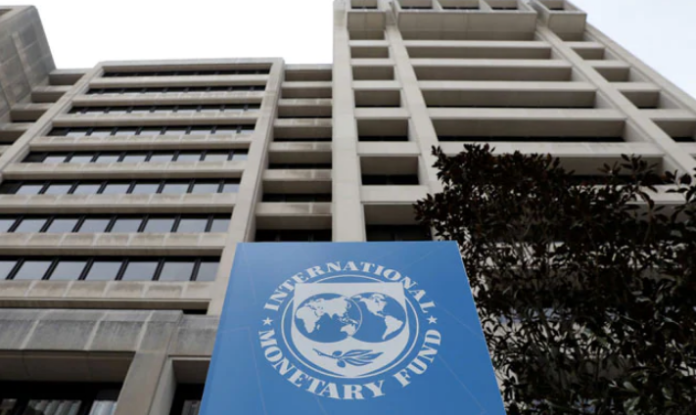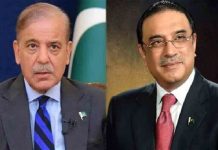———- PM maintains ‘we have to get rid of debts’
———- Adds “friendly nations repeated history by supporting Pakistan”
———- Lauds ‘significant’ cut in monetary policy rate
———- IMF board to meet on 25th to discuss approval of $7bn bailout agreement reached with Pakistan
Staff Report
ISLAMABAD: The International Monetary Fund (IMF) has finally added Pakistan’s new 37-month Extended Fund Facility (EFF) to an agenda of its Executive Board meetings scheduled for September 25, with Prime Minister Shehbaz Sharif heaping praise on friendly nations for extending all-out support to help Islam-abad in securing the bailout package.
Islamabad and the global lender reached an agreement on the 37-month loan programme in July this year. The IMF has said the programme was subject to approval from its executive board and obtaining “timely confirmation of necessary financing assurances from Pakistan’s development and bilateral partners”. Pakistan was required to secure external financing of $2 billion from bilateral and commercial lenders as a pre-requisite for the IMF board’s approval.
According to insiders, Pakistan already owes $5 billion to Saudi Arabia in the form of cash deposits. It must be noted that Pakistan also holds $4 billion in deposits from China and $3 billion from the UAE.
These amounts are separate from an additional $4.5 billion in commercial loans, including those from China, sources quoted the ministry officials as saying.
“We are very happy to share that the board meeting is scheduled to take place on September 25 [to discuss the approval of $7 billion EFF agreement reached with Pakistan],” IMF’s spokesperson Julie Kozack said while addressing a press briefing today. “This is following Pakistan obtaining the necessary financing assurances from its development part-ners. The new EFF arrangement follows the successful implementation of the 2023 nine-month standby arrangement,” the spokesperson noted.
Kozack said that the Pakistani authorities acknowledged that the permanent implementation of the new extended fund facility was essential to pave way for sustainable development. She further said that consistent policymaking has supported economic stability in Pakistan, most nota-bly a resumption of growth, significant disinflation, and a significant increase in the country’s interna-tional reserves.
Welcoming the development, Minister for Finance and Revenue Muhammad Aurangzeb said that all matters with the IMF have been settled amicably.
He expressed gratitude to Prime Minister Shehbaz Sharif’s team, the IMF negotiators, and the rele-vant institutions.
“The matters will be finalised in the meeting of the IMF board this month,” Aurangzeb said, adding that the country’s economy was moving towards growth after stabilisation.
He added that the reduction in the policy rate will “increase investment and business activities in the country”. “Increasing economic activities will create employment opportunities,” the minister added.
“The common man has started getting relief from the trend of continuous reduction in the rate of in-flation,” he concluded.
Earlier today, State Bank of Pakistan (SBP) Governor Jameel Ahmad said that the country has arranged more than $2 billion in financing and assurances from lenders other than the IMF, adding that the ex-ternal funding was seen as the “final hurdle” for the loan programme, as per a report published by Bloomberg.
“All those assurances and external financing have already been arranged by the government and I don’t see any further hurdle now in taking our case to the board,” said Ahmad.
The country also raised its tax revenue goal by a record 40% and increased energy prices to meet de-mands set by the global lender. Pakistan completed its previous $3 billion loan programme in April.
The country secured a credit rating upgrade from Moody’s Ratings and Fitch Ratings in late August. The IMF programme brings certainty to Pakistan’s sources of financing to meet its needs over the next two to three years, Moody’s said.
Ahead of the IMF’s statement, the prime minister termed the progress with IMF on the bailout “good” and praised the friendly countries support in this regard.
“We have to get rid of debts […] Pakistan must stand on its own feet,” the prime minister stressed while addressing the federal cabinet meeting, hoping that the forthcoming IMF package would be the country’s last.
PM Shehbaz said that the friendly nations have once again extended their support as he refused to divulge into details. “They have repeated the history and supported Pakistan.”
However, he regretted that Pakistan was a nuclear country and “repeated requests for loans will de-crease its importance”.
The premier said that the government was making efforts to secure the IMF bailout package, assuring “good progress” in talks with the global lender.
He also lauded the announcement by the State Bank of Pakistan to slash the policy rate by 2%, calling it a step to boost investors’ confidence. He hoped that the policy rate will be slashed to single-digit, just like inflation rate.
Pakistan has relied heavily on IMF programmes for years, at times nearing the brink of sovereign de-fault and having to turn to countries such as the United Arab Emirates and Saudi Arabia to provide it with financing to meet external financing targets set by the IMF.




